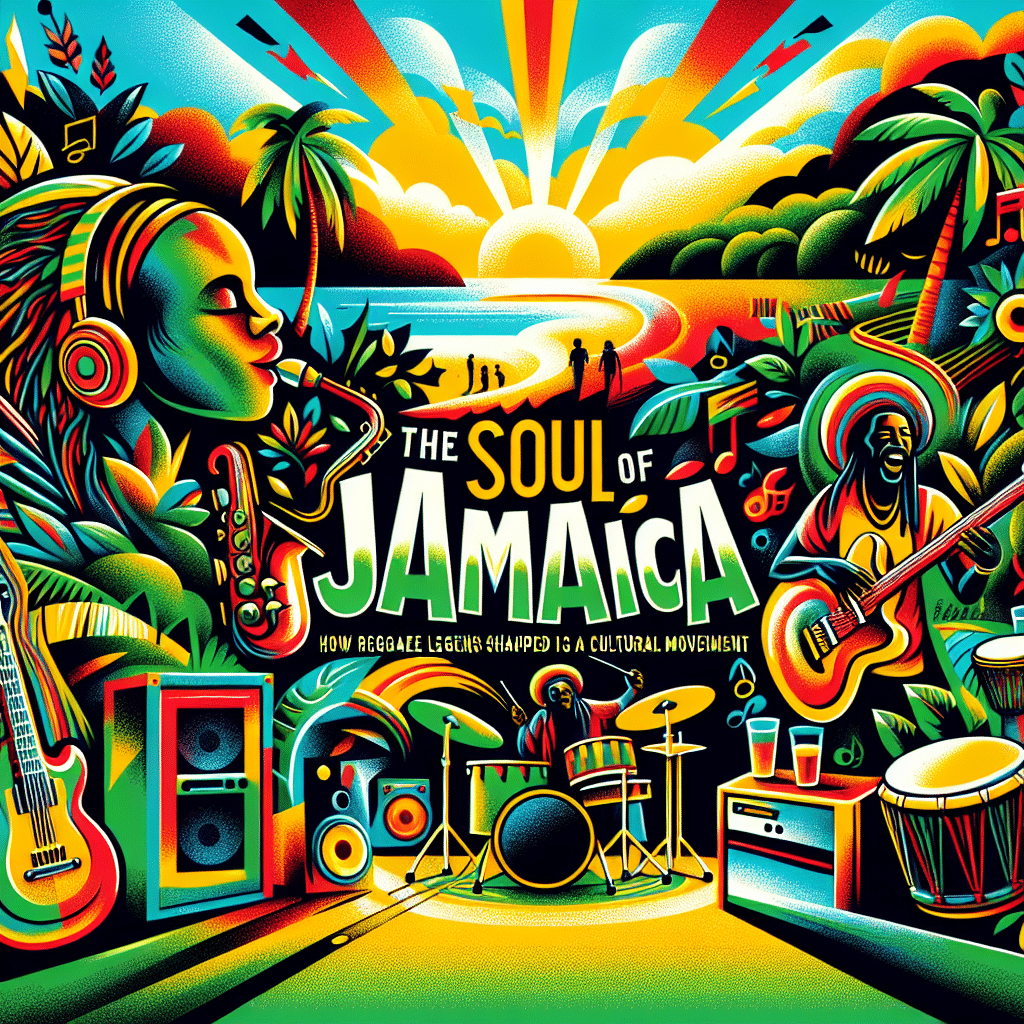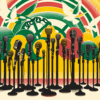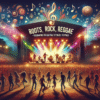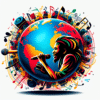The Soul of Jamaica: How Reggae Legends Shaped a Cultural Movement

Introduction
Jamaica, a small island nation in the Caribbean, has had a monumental impact on the global music scene, most notably through its distinctive and vibrant reggae genre. Emerging in the 1960s, reggae is not merely a musical style; it is a cultural movement that embodies the spirit, struggles, and resilience of the Jamaican people. Anchored by legendary artists such as Bob Marley, Peter Tosh, and Jimmy Cliff, reggae has transcended national boundaries, resonating deeply with audiences worldwide. This article explores the rich tapestry of reggae music and its profound influence on both Jamaican culture and the global social landscape.
The Roots of Reggae
Origins in Ska and Rocksteady
Before reggae took center stage, Jamaica was alive with musical experimentation. The late 1950s saw the rise of ska, characterized by an upbeat tempo and heavily accented offbeats, which later evolved into rocksteady, slower and more soulful. These genres provided fertile ground for reggae to emerge in the late 1960s, combining elements of rhythm and blues, jazz, and traditional Jamaican folk music. Reggae not only reflected Jamaica's social issues but also became a platform for political expression.
See Also: Voices of Freedom: The Political Impact of Reggae Legends
Voices of Freedom: The Political Impact of Reggae LegendsThe Emergence of Reggae
Reggae's popularity surged with the advent of artists who infused the genre with their unique experiences and perspectives. By addressing societal issues such as poverty, inequality, and oppression, these musicians gave voice to the Jamaican people. The most notable figure among them, Bob Marley, would go on to become a global icon, offering a message of unity and resistance that resonated with millions.
The Legends of Reggae
Bob Marley: The King of Reggae
Bob Marley is arguably the most recognized name in reggae music. His lyrics conveyed profound messages of love, peace, and resistance, and his style blended traditional Jamaican sounds with elements of rock and rhythm. Albums like “Catch a Fire,” “Rastaman Vibration,” and “Exodus” are timeless classics, contributing to a cultural identity that celebrates heritage and resilience against adversity. Not only did Marley elevate reggae to an international platform, but he also brought attention to the Rastafarian movement, emphasizing spirituality, social justice, and Pan-Africanism.
Peter Tosh: The Revolutionary Voice
See Also: Roots, Rock, Reggae: Celebrating the Heartbeat of Music Festivals
Roots, Rock, Reggae: Celebrating the Heartbeat of Music FestivalsPeter Tosh, a founding member of The Wailers alongside Marley, made significant contributions with his uncompromising political stance. Through songs like “Equal Rights,” “Get Up, Stand Up,” and “Legalize It,” Tosh advocated for social reform and the legalization of marijuana, framing these issues within the larger struggle for human rights. His fierce commitment to justice and equality defined him as a revolutionary voice who pushed the boundaries of reggae music and its political implications.
Jimmy Cliff: The Soulful Storyteller
Jimmy Cliff is known for his ability to weave narratives into his music. His performance in the film "The Harder They Come" further propelled reggae into the global consciousness. Songs such as “Many Rivers to Cross” and “You Can Get It If You Really Want” celebrate the human spirit and resilience. Through his storytelling, Cliff painted a picture of the Jamaican struggle while inspiring listeners to overcome their adversities.
Cultural Significance of Reggae
A Catalyst for Social Change
Reggae music served as both a form of entertainment and a channel for political discourse. During times of political turmoil and economic hardship in Jamaica, reggae provided a voice for the marginalized, galvanizing public sentiment and promoting social change. Artists used their platforms to speak against colonialism, systemic racism, and poverty, invoking solidarity and awareness.
See Also: Reggae Revolution: Unpacking the Influence of Legends Like Peter Tosh and Bunny Wailer
Reggae Revolution: Unpacking the Influence of Legends Like Peter Tosh and Bunny WailerPromoting Unity and Identity
Reggae embodies a unique cultural identity for Jamaica. The genre has blended African and Caribbean influences, creating a distinct sound that represents the struggles and triumphs of the Jamaican people. With its messages rooted in spirituality, equality, and love, reggae continues to foster a sense of unity both within Jamaica and among its global audience.
Global Influence and Legacy
The impact of reggae extends far beyond the shores of Jamaica. The genre has influenced various music styles, including punk, hip-hop, and electronic music, leading to the birth of new movements worldwide. Festivals dedicated to reggae are held internationally, celebrating its diverse expressions. Iconic songs have been covered by artists across genres, proving reggae’s enduring appeal and relevance in fostering cultural dialogue.
Conclusion
See Also: Rhythms of Resistance: The Enduring Legacy of Reggae Legends
Rhythms of Resistance: The Enduring Legacy of Reggae LegendsThe legacies of reggae legends like Bob Marley, Peter Tosh, and Jimmy Cliff resonate deeply within Jamaica and beyond. These artists not only crafted a musical genre that defined a nation but also served as catalysts for social change, embodying the struggles and aspirations of their people. Reggae continues to inspire new generations, transcending geographical and cultural boundaries. It serves as a reminder of the transformative power of music in advocating for love, unity, and equality.
As we reflect on the significance of reggae and its legends, we can appreciate how these artists carved out a cultural movement that remains potent decades after its inception. The soul of Jamaica, expressed through reggae, lives on, continuing to inspire resilience and connection in a world that often needs both.
FAQs
What is reggae music?
Reggae is a Jamaican music genre that originated in the late 1960s, characterized by its rhythmic style and socially conscious lyrics. It combines elements of ska, rocksteady, and rhythm and blues.
See Also: From Jamaica to the World: The Impact of Reggae Icons on Global Music
From Jamaica to the World: The Impact of Reggae Icons on Global MusicWho are the most prominent reggae legends?
The most prominent reggae legends include Bob Marley, Peter Tosh, Jimmy Cliff, Bunny Wailer, and Toots and the Maytals, among others. Each has contributed significantly to the genre and its global appeal.
How did reggae music influence social change?
Reggae music addressed pivotal social issues like poverty, racial inequality, and political oppression. Artists used their platforms to raise awareness and instigate change, making it an essential part of Jamaica's cultural and social fabric.
Is reggae music still popular today?
Yes, reggae music remains popular today, with festivals, tribute concerts, and reggae fusion genres worldwide. New artists continue to draw inspiration from the reggae legends while maintaining the cultural essence of the genre.
See Also: Reggae Revolution: How Jamaican Beats Conquered the World
Reggae Revolution: How Jamaican Beats Conquered the WorldWhat is the relationship between reggae and Rastafarianism?
Rastafarianism, a religious and social movement that emerged in Jamaica in the 1930s, is deeply intertwined with reggae. Many reggae artists, most famously Bob Marley, incorporated Rastafarian themes into their music, promoting spirituality, social justice, and Pan-Africanism.
If you want to know other articles similar to The Soul of Jamaica: How Reggae Legends Shaped a Cultural Movement you can visit the category Reggae.
